Born in Rivoli, Turin, Italy in 1941, Silvio Daneo completed a degree in Accounting and a baccalaureate in Theology, then he obtained a Masters degree in Intercultural and Interreligious Mediation summa cum laude from the Salesian Pontifical University (UPS) and the Academy of Human and Social Sciences (ASUS) in Rome, Italy. Since 1959, he had been a member of the Focolare Movement. He was first assigned to the Focolare in New York City (1962-1966) where he contributed to the foundation of the first Men’s Focolare centers in North America.
Then moving on to another continent, for nearly thirty years (1966-1995), he became one of the co-founders and directors of the Focolare Movement in different countries of Asia (Philippines, Hong Kong, India, and Thailand). He also spent some time in Pakistan, Singapore, Korea, Japan, and Vietnam, Indonesia, Malaysia, Taiwan, Macau, and China, as well as in the United Arab Emirates. Committed to the Focolare’s work in interreligious dialogue, since 1977 he had been active in “Religions for Peace,” an organization which is present on all continents, representing 90 countries. He was the Executive Director of Religions for Peace in Italy.
He also served as a volunteer of the Roman “Caritas,” providing assistance to the inmates of the main prison of Rome. In addition, he was one of those who coordinated the collection of food for the needy in hundreds of supermarkets with the “Food Bank Association.” He was Vice-President of “Together for a Healthier Heart,” a non-profit organization which promotes the prevention, research and formation for the cure of heart diseases.
New City magazine is published in Asia
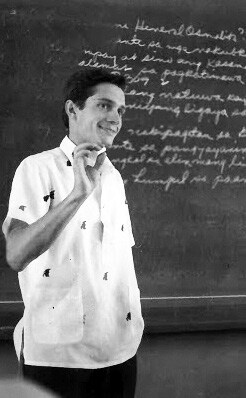
Fr. Josef Taschner, an SVD priest, first published a simple periodical with the monthly “Word of Life,” a Focolare commentary on a certain biblical passage, together with some experiences which spread throughout the many islands of the Philippines
in the 1960s. Its circulation reached 14,000 copies every month. Very soon, after the first focolarinos and focolarinas landed in the Philippines in 1966, they felt the need to publish a local edition of the Italian magazine “Città Nuova,” the official magazine of the Movement.
Silvio narrates, “We planned a monthly magazine which would deal with the various aspects of the spirituality, some true-to-life experiences, and the “Word of Life” for every month.” Through this means, Silvio together with the pioneers of the Focolare in the Philippines hoped to reach many friends scattered all over the Philippines, as well as in neighboring countries. They considered it an important instrument for the formation of the members of the Movement.
Going to the St. Paul Fathers at their printing press in Pasong Tamo, Makati, they met Fr. Leonardo Zega, who would later on become the director of the famous weekly “Famiglia Cristiana” in Italy, a weekly religious publication with the largest circulation in Europe. Fr. Leonardo welcomed them so warmly, being a young missionary priest in his early experience as a publisher. He was very helpful to them, and guided Silvio’s work from a technical point of view.
Part of the material to be published would be taken from the North American English edition of New City, the same magazine for which Silvio had worked so hard for years while he was in New York City. The rest of the articles would have to be written by him and the other focolarini themselves. They, therefore, had to provide the materials; while the Paulist Fathers would do all the work of publishing.
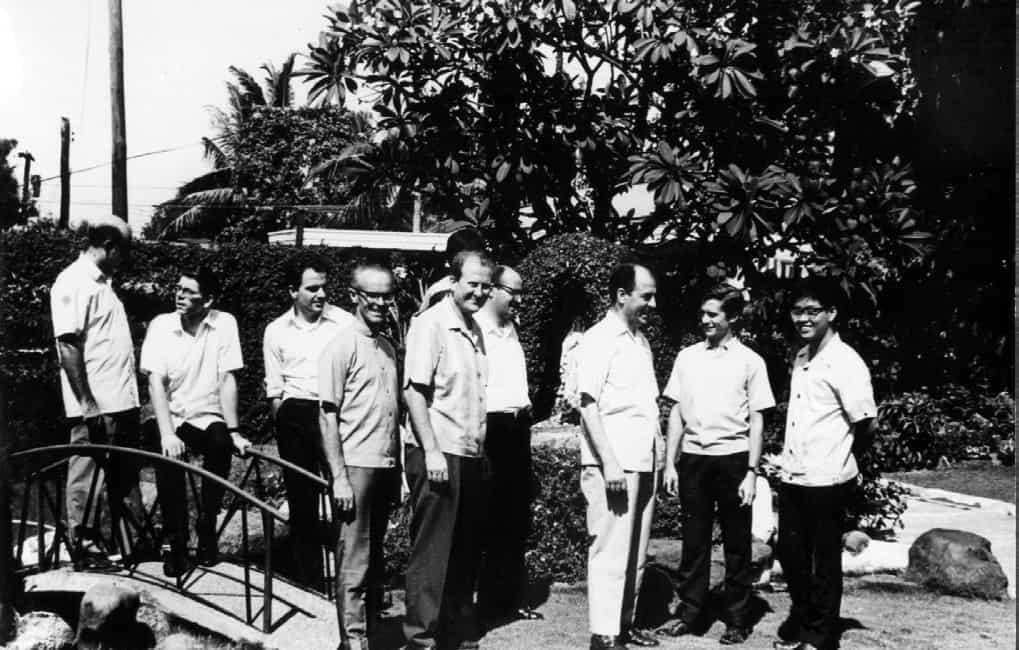
Silvio recalls those moments: ”One of the first questions Fr. Zega asked us was: “How many copies are you intending to print?” I remembered that in the U.S., we had a circulation of 2,000 copies and we distributed them with great effort. Without a moment’s hesitation, Fr. Guido Mirti (better known as Cengia, one of Chiara Lubich’s first companions who founded and established the Focolare in Asia) promptly answered: “We need at least 16,000.” I was astonished… We had no car and we lived on the third floor of a small apartment (without an elevator of course); so I looked at Cengia with mixed feelings, hardly believing my ears… But, before I could say a word, he explained: “Before the Communists can take over, we must cover the whole of Asia with Chiara’s writings on the spirituality! We have no time to waste, don’t you think so?”
How could I possibly contradict him? At the end of May, just about the time for the opening of schools and of De La Salle College in Manila, we went to pick up the first issue of New City Magazine, Volume 1, No. 1, May-June 1966 (bimonthly). Price: 30 centavos. Editor: Fr. Guido Mirti. Executive Director: Silvio Daneo. There were indeed 16,000 copies! I clearly remember the sweat, fatigue, and “torture” of carrying all those packages of the magazine up to the third floor apartment… We were even afraid that the floor would give way due to the very heavy load of those thousands and thousands of copies. However, printing and depositing the copies on the third floor was just the beginning of the work! Now, we had to distribute them and, possibly, sell as many copies as we could.
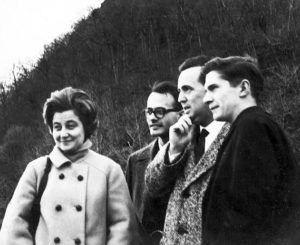
Otherwise, we would have to stop the publication and end it after the first issue. We started visiting Catholic schools, parishes, and convents. Every morning, we would leave the apartment with bags full of “New City” magazines and go around Manila, Quezon City, and the surrounding areas (with public transport, of course). Thus we made many new acquaintances, got to know new places and environments, and acquired new friends, thus multiplying the occasions for meetings, gatherings, and occasions to talk to students in schools, etc. Life was becoming ever more intense.”
Silvio’s battle cry: the least, the lost and the last
We’d like to share some of Silvio’s experiences in caring for the poor and the “poorest among the poor.” Silvio shares: “For the past twenty years, since returning to Europe, from Asia, or from Thailand to be precise, circumstances led me to be involved in the “Rome Food Bank,” an organization which distributes food to people in need. Every month we would help around 120,000 people meet their basic needs. Much of the food is provided by the European Union, but a substantial amount is collected through our campaign, once a year, which is conducted in about 400 supermarkets in the city of Rome, where customers are welcome to contribute food, that they pay for and we collect in order to distribute to people in need. Last year, 2018, the collection reached nearly 300 tons of excellent food. The collection involved 2,900 volunteers representing 392 groups and associations.
I, together with others from the Focolare, in our limited way, were able to help around 1,000 people on a monthly basis: families with children, abandoned old people, immigrants who were jobless but with a family, and foreigners as well as Italians.”
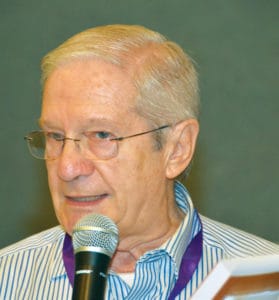 There was a young Italian couple with a baby girl, who had decided to go for an abortion since the young wife was pregnant again. The young man was jobless, and in a desperate situation … Silvio talked to them at length and promised to help them in all possible ways. They would return regularly to see Silvio and get the usual supply of food. Then one day, they showed him their three-month-old baby, with pride and great joy on their faces.
There was a young Italian couple with a baby girl, who had decided to go for an abortion since the young wife was pregnant again. The young man was jobless, and in a desperate situation … Silvio talked to them at length and promised to help them in all possible ways. They would return regularly to see Silvio and get the usual supply of food. Then one day, they showed him their three-month-old baby, with pride and great joy on their faces.
Silvio also decided to join a course of formation to become a “volunteer” in the huge metropolitan city jail of Rome, For almost twenty years, he served as a volunteer duly authorized by the Ministry of Justice.
For him, visiting the prison twice a week was one of his greatest experiences. The inmates belonged to different nationalities, cultures, languages and religions. About 70 percent were young people. On one occasion, during the month of Ramadan, he even managed to obtain permission for an Imam friend to go every Friday and stay with several Muslims who were in jail.
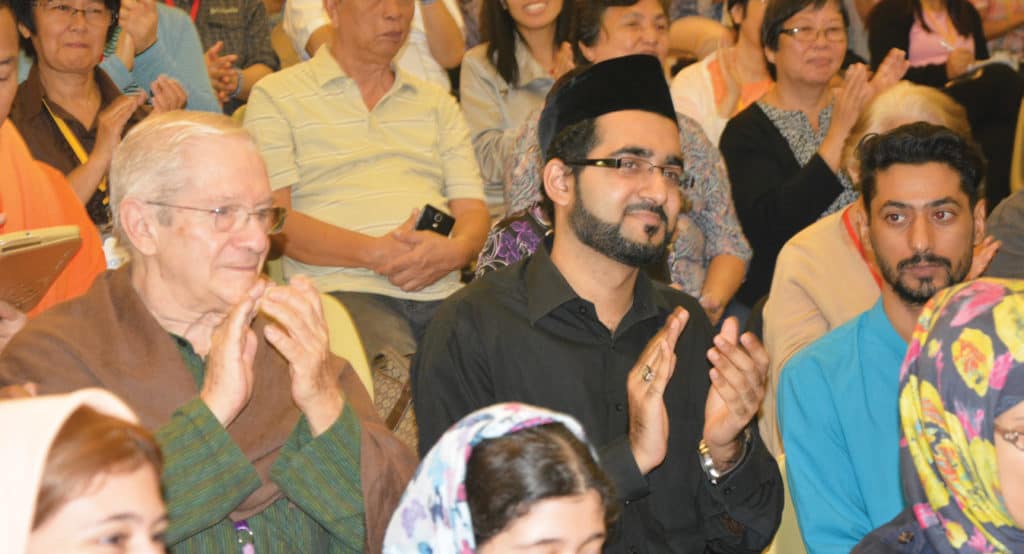
He continued, “It was not only a question of visiting them … There were so many other things I was asked to do for them once I left the Institute: make telephone calls to the families, consult the lawyers, prepare packages of clothing for many of them who
had no family in the area and lacked almost everything … At times, it was a question of depositing some money into a prisoner’s account, so that they could finally make a phone call to their loved ones. Other times, it meant providing the right medicine for them which the system does not supply, etc.
The relationship established with so many of them went even deeper than the one they have with their relatives. I could write a book about this. Towards the end, I was regularly visiting more than 70 inmates in the men’s prison in Rome. Then some of them were transferred to another city jail, but they begged me to continue visiting them, at least once in a while. So, after getting the necessary permission, I would travel to their new locations and continue this wonderful relationship of accompaniment.”
Silvio’s major commitment…
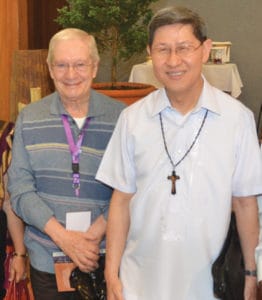
One of the main activities and commitments of Silvio was in the field of Interreligious Dialogue as the Executive Director of Religions for Peace in Italy. He affirmed the amazing progress that has been made in this dialogue. He clarified, “This interreligious and ecumenical dialogue goes hand in hand with the work in favor of the poorest and needy. I am convinced that they are but the two faces of the same coin. It will never be politics or economic systems to save the destiny of humanity, but the Love which every religion preaches. A motto so dear to me is an emblem of my Muslim Ahmadiyya friends, coined by their third spiritual leader: “Love for all, hatred for none.” It is a reminder of the “Golden Rule” which is the common denominator of every religion. It also reminds us of the “Art of Loving” so perfectly explained and lived by Chiara Lubich. We already know so much! Let’s help each other in translating all we know into practice, as much as we can! This is our task and commitment.”
Romeo Pelayo Vital
Some of these accounts were taken from Silvio Daneo’s book “My Life Across the Oceans” and from a talk that he wrote for the SOR 2019 symposium in Hong Kong which the author of this article read during the symposium while Silvio was sick and dying in Italy last February 23, 2019.
The books of Silvio published by New City Press
“My Life Across the Oceans” is a book written by Silvio Daneo detailing his personal account of the arrival and development of the Focolare Movement in North America and Asia. Here is a short excerpt from the preface by Silvio:
“These pages, full of facts and experiences, are but a thanksgiving to the true Author of what is being narrated. I give Him thanks for having used His invisible hand in “grabbing” me, almost compelling me to follow Him into this extraordinary adventure which is still ongoing…”
“No matter how rich and creative my fantasy as a teenager was, I could never ever have foreseen how inexhaustible Divine fantasy can be! Without planning it and almost without realizing it, I found myself involved in a Divine adventure which is much more real than certain very attractive and fascinating human life experiences destined at times to be simply represented in films considered for Oscar nominations.”
“Paths Beyond Imagining” is a compelling summary of the most authoritative teachings of the Second Vatican Council on interreligious dialogue. The author draws from his own experiences of life on three continents since the early sixties culminating in an incredible evolution of dialogue in recent years that even involves non-believers.
“After fifteen centuries of isolation, indifference and hostility, Churches and Religions have awakened: paths beyond imagining have appeared in dialogue. It is a reality that is constantly growing, which now involves the entire multicultural, multi-ethnic and multi-religious society in which we live.
“For those who are not aware of the events in this regard, these pages provide an opportunity to understand the powerful action of the Spirit within the Catholic Church and even beyond, in all backgrounds, religious or otherwise, that exist in our planet.”




